

Assessments of Information Literacy available online (Information Literacy Assessments) Information Competency Proficiency Exam - Gavilan College - "Use or modification is permitted as long as acknowledgement is made to the Bay Area Community Colleges Information Competency Assessment Project.
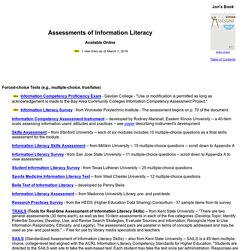
" Information Literacy Survey - from Worcester Polytechnic Institute - The assessment begins on p. 70 of the document. Information Competency Assessment Instrument -- developed by Rodney Marshall, Eastern Illinois University -- a 40-item scale assessing information users' attitudes and practices -- see paper describing instrument's development. Parent Social Media Guide for Students Over 13. Family members today have a new job: helping children act safely and responsibly when they are using social media, whether for fun or for learning.
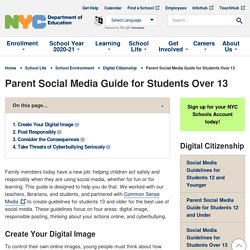
This guide is designed to help you do that. We worked with our teachers, librarians, and students, and partnered with Common Sense Media(Open external link) to create guidelines for students 13 and older for the best use of social media. These guidelines focus on four areas: digital image, responsible posting, thinking about your actions online, and cyberbullying. Create Your Digital Image To control their own online images, young people must think about how they want the world to identify them.
Family Activities Throughout this guide we will share activities you can do with students followed by information sharing why such activities are helpful. Headline Exercise If your child was the subject of a newspaper article, what would she want the headline to read? Why it Helps This activity gets the digital image conversation started. Lesson Plans – Search Education – Google. Picking the right search terms Beginner Pick the best words to use in academic searching, whether students are beginning with a full question or a topic of just a few words.
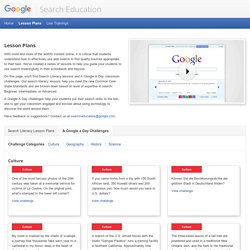
View lesson Advanced Explore "firm" and "soft" search terms, and practice using context terms to locate subject-specific collections of information on the web. Understanding search results Learn about the different parts of the results page, and about how to evaluate individual results based on cues like web addresses and snippets. Engage additional search strategies, such as generalization and specialization. Teaching Tolerance. Excerpted from Netiquette by Virginia Shea.
The Core Rules of Netiquette are excerpted from the book Netiquette by Virginia Shea.
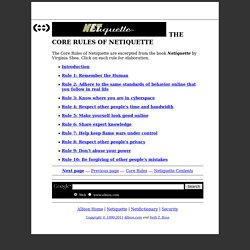
Click on each rule for elaboration. What is the key to achieving a digitally literate society? Young people’s ability to evaluate the information they find online is ‘bleak’.
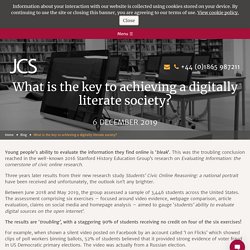
This was the troubling conclusion reached in the well-known 2016 Stanford History Education Group’s research on Evaluating Information: the cornerstone of civic online research. Three years later results from their new research study Students’ Civic Online Reasoning: a national portrait have been received and unfortunately, the outlook isn’t any brighter. Between June 2018 and May 2019, the group assessed a sample of 3,446 students across the United States.
The assessment comprising six exercises – focused around video evidence, webpage comparison, article evaluation, claims on social media and homepage analysis – aimed to gauge ‘students’ ability to evaluate digital sources on the open internet’. Using a Mock Trial to Build Literacy Skills. The courtroom is breathless as the state’s attorney rises to present her opening statement in the case of Chris Archer v.
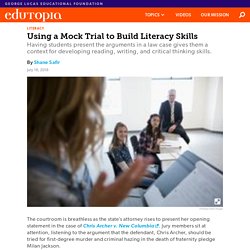
New Columbia. Jury members sit at attention, listening to the argument that the defendant, Chris Archer, should be tried for first-degree murder and criminal hazing in the death of fraternity pledge Milan Jackson. This courtroom is actually a classroom, and I’ve shed my educator identity to preside as Judge Safir over an impressive mock trial staged by students in the Race, Policy, and Law (RPL) Academy at Oakland Technical High School. As a young teacher, I led a law academy program for urban students and incorporated mock trials into my U.S. history and pre-law courses. I learned firsthand the impact this strategy can have on the literacy skills of all students, but particularly those those who haven’t had much access to rigorous academic experiences.
And just as important, they’re fun. Mock trials do take some preparation. Courtesy of Shane Safir. Information Fluency. Google Applied Digital Skills - Teach & Learn Practical Digital Skills. Brooklyn Public Library. How long is the course?
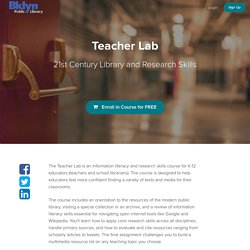
The course will take approximately 12 hours to complete. Course content is a mixture of video lectures and independent work. When does the course start and finish? This is a self-paced online course with no end date. P-credit enrollees must complete the course by the close of the ASPDP semester. How long do I have access to the course? After enrolling, you have unlimited access to all course modules for as long as you like - across any and all devices you own. What Is Digital Literacy? Ava reads at Indian Run Elementary School in Dublin, Ohio. The school integrates iPads, laptops, and books into reading time.
—Maddie McGarvey for Education Week Digital Literacy: An Evolving Definition While the word "literacy" alone generally refers to reading and writing skills, when you tack on the word "digital" before it, the term encompasses much, much more. Sure, reading and writing are still very much at the heart of digital literacy. What Digital Literacy Looks Like in a Classroom - Education Week Teacher.